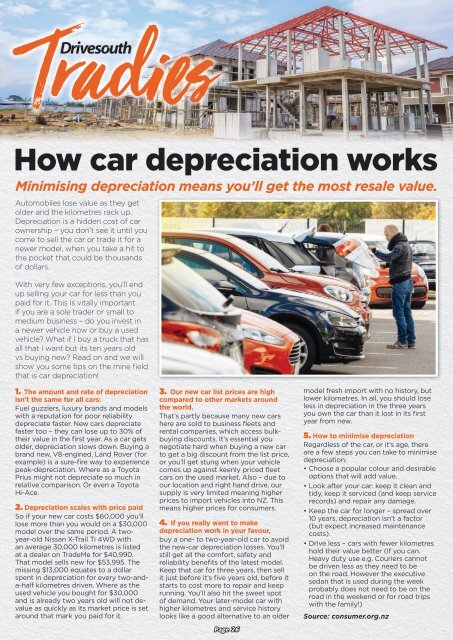Create successful ePaper yourself
Turn your PDF publications into a flip-book with our unique Google optimized e-Paper software.
Tradies<br />
How car depreciation works<br />
Minimising depreciation means you’ll get the most resale value.<br />
Automobiles lose value as they get<br />
older and the kilometres rack up.<br />
Depreciation is a hidden cost of car<br />
ownership – you don’t see it until you<br />
come to sell the car or trade it for a<br />
newer model, when you take a hit to<br />
the pocket that could be thousands<br />
of dollars.<br />
With very few exceptions, you’ll end<br />
up selling your car for less than you<br />
paid for it. This is vitally important<br />
if you are a sole trader or small to<br />
medium business – do you invest in<br />
a newer vehicle now or buy a used<br />
vehicle? What if I buy a truck that has<br />
all that I want but its ten years old<br />
vs buying new? Read on and we will<br />
show you some tips on the mine field<br />
that is car depreciation!<br />
1. The amount and rate of depreciation<br />
isn’t the same for all cars:<br />
Fuel guzzlers, luxury brands and models<br />
with a reputation for poor reliability<br />
depreciate faster. New cars depreciate<br />
faster too – they can lose up to 30% of<br />
their value in the first year. As a car gets<br />
older, depreciation slows down. Buying a<br />
brand new, V8-engined, Land Rover (for<br />
example) is a sure-fire way to experience<br />
peak-depreciation. Where as a Toyota<br />
Prius might not depreciate so much in<br />
relative comparison. Or even a Toyota<br />
Hi-Ace.<br />
2. Depreciation scales with price paid<br />
So if your new car costs $60,000 you’ll<br />
lose more than you would on a $30,000<br />
model over the same period. A twoyear-old<br />
Nissan X-Trail Ti 4WD with<br />
an average 30,000 kilometres is listed<br />
at a dealer on TradeMe for $40,990.<br />
That model sells new for $53,995. The<br />
missing $13,000 equates to a dollar<br />
spent in depreciation for every two-anda-half<br />
kilometres driven. Where as the<br />
used vehicle you bought for $30,000<br />
and is already two years old will not devalue<br />
as quickly as its market price is set<br />
around that mark you paid for it.<br />
3. Our new car list prices are high<br />
compared to other markets around<br />
the world.<br />
That’s partly because many new cars<br />
here are sold to business fleets and<br />
rental companies, which access bulkbuying<br />
discounts. It’s essential you<br />
negotiate hard when buying a new car<br />
to get a big discount from the list price,<br />
or you’ll get stung when your vehicle<br />
comes up against keenly priced fleet<br />
cars on the used market. Also – due to<br />
our location and right hand drive, our<br />
supply is very limited meaning higher<br />
prices to import vehicles into NZ. This<br />
means higher prices for consumers.<br />
4. If you really want to make<br />
depreciation work in your favour,<br />
buy a one- to two-year-old car to avoid<br />
the new-car depreciation losses. You’ll<br />
still get all the comfort, safety and<br />
reliability benefits of the latest model.<br />
Keep that car for three years, then sell<br />
it just before it’s five years old, before it<br />
starts to cost more to repair and keep<br />
running. You’ll also hit the sweet spot<br />
of demand. Your later-model car with<br />
higher kilometres and service history<br />
looks like a good alternative to an older<br />
Page 26<br />
model fresh import with no history, but<br />
lower kilometres. In all, you should lose<br />
less in depreciation in the three years<br />
you own the car than it lost in its first<br />
year from new.<br />
5. How to minimise depreciation<br />
Regardless of the car, or it’s age, there<br />
are a few steps you can take to minimise<br />
depreciation:<br />
• Choose a popular colour and desirable<br />
options that will add value.<br />
• Look after your car: keep it clean and<br />
tidy, keep it serviced (and keep service<br />
records) and repair any damage.<br />
• Keep the car for longer – spread over<br />
10 years, depreciation isn’t a factor<br />
(but expect increased maintenance<br />
costs).<br />
• Drive less – cars with fewer kilometres<br />
hold their value better (If you can.<br />
Heavy duty use e.g. Couriers cannot<br />
be driven less as they need to be<br />
on the road. However the executive<br />
sedan that is used during the week<br />
probably does not need to be on the<br />
road in the weekend or for road trips<br />
with the family!)<br />
Source: consumer.org.nz


















